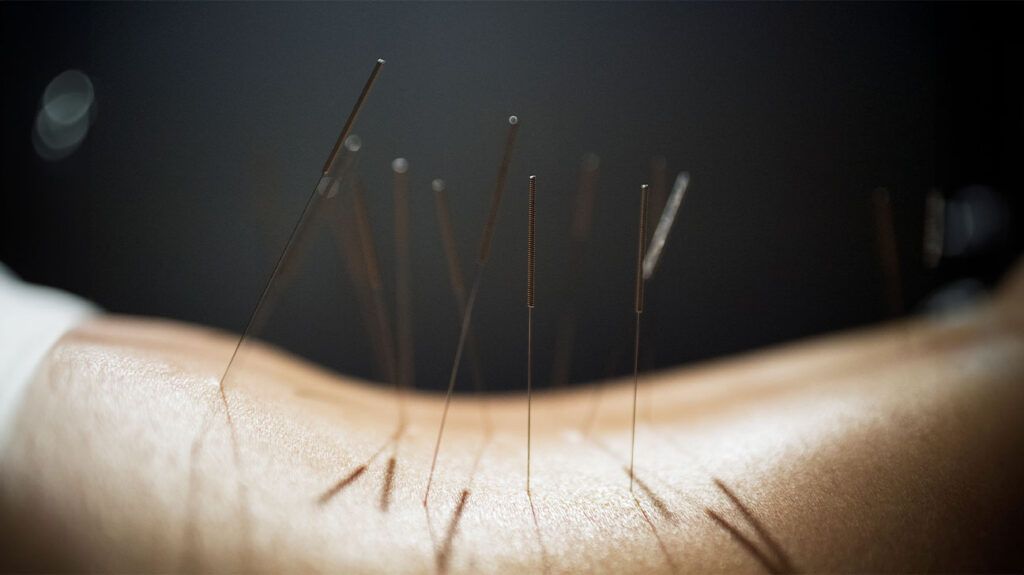Acupuncture is not part of the standard of care for endometriosis. However, for people who cannot find relief from standard treatment options, acupuncture may be helpful.
At present, surgery is the only definitive way to diagnose endometriosis, and treatment options are limited. Many people with the condition live with chronic pain and symptoms that affect their daily lives.
For this reason, some turn to alternative therapies such as acupuncture.
While a small number of clinical trials suggest acupuncture may help, placebo-controlled trials are rare, and the data supporting the technique for endometriosis are inconclusive.
Read on to learn more about acupuncture for endometriosis.

Acupuncture may help some people with endometriosis, but the evidence is limited. A few small studies suggest that it may improve endometriosis symptoms.
One of the only randomized, placebo-controlled trials, which scientists published in 2023, found a link between acupuncture and endometriosis improvements.
Researchers compared outcomes between an acupuncture group and a sham acupuncture group. Practitioners discontinued acupuncture after 12 weeks. Endometriosis symptoms in the acupuncture group improved at 12 weeks, compared with the control group. However, at 24 weeks — 12 weeks after ceasing the acupuncture — there were no significant differences between the groups. The study suggests that acupuncture can have a positive effect on people with endometriosis symptoms but becomes less effective after discontinuing it.
A 2023 systematic review explored previous research on acupuncture, moxibustion, and other alternative remedies in Eastern medicine. That study looked at 15 trials involving 1,018 people and found low to moderate quality evidence supporting the effectiveness of acupuncture for endometriosis. Overall, the study concluded that acupuncture and moxibustion can serve as alternative treatment options for people with endometriosis. However, more research is necessary.
Another 2021 systematic review included seven randomized controlled trials.
Researchers measured success by pain levels 1 year after the study as well as levels of a serum antigen relating to endometriosis. By all measures, the acupuncture group had more positive results than the control group.
One of the challenges of studying acupuncture points for endometriosis is that researchers have looked at a wide variety of acupuncture points. Often, one study does not replicate the points of a prior study, making it difficult to assess overall efficacy.
Some acupuncture points researchers commonly use include:
- CV1
- CV3
- CV6
- BL18
- BL20
- BL23
- ST35
One popular protocol, the Cridennda Magarelli Acupuncture Protocol (CMAP), aims to increase the effectiveness of in vitro fertilization (IVF). This is because people with endometriosis
A 2019 study of 112 people undergoing IVF compared those who used the typical protocol to those who underwent IVF along with CMAP. Pregnancy rates were higher, at 58.8%, than in the control group, which had a pregnancy rate of 46.6%.
This suggests this protocol may improve IVF rates.
Several studies have found that acupuncture can help endometriosis symptoms. It may also improve pregnancy rates among people with endometriosis who are trying to conceive.
However, acupuncture has not become a part of the standard of care. This
Acupuncture might complement these treatments, but there is insufficient evidence that it could replace them. Most studies of the method for treating endometriosis have been small in size and lack quality placebo controls.
As with acupuncture, there is insufficient support for other alternative and complementary treatments for endometriosis. Anecdotally, some people experience benefits with alternative treatments, but these methods are not a substitute for standard care.
Some alternative options include:
- stress management techniques
- special diets
- identifying and minimizing triggers, such as stress
- massage therapy
A person considering acupuncture for endometriosis should ask their doctor or a licensed acupuncturist the following:
- Are there other treatments I should consider trying?
- Is acupuncture safe to use along with my current treatment regimen?
- How will I know the treatment is working?
- What are the risks of acupuncture, and what can I do to mitigate those risks?
A person can find a licensed acupuncturist via the National Certification Commission for Acupuncture and Oriental Medicine.
Acupuncture for endometriosis is a promising but unproven treatment.
It may work best when a person chooses it alongside standard treatments. This is because there is insufficient evidence to support using acupuncture to replace typical treatments.
Acupuncture may be a useful component of treatment, but research has not yet thoroughly tested its use nor proven its effectiveness.
